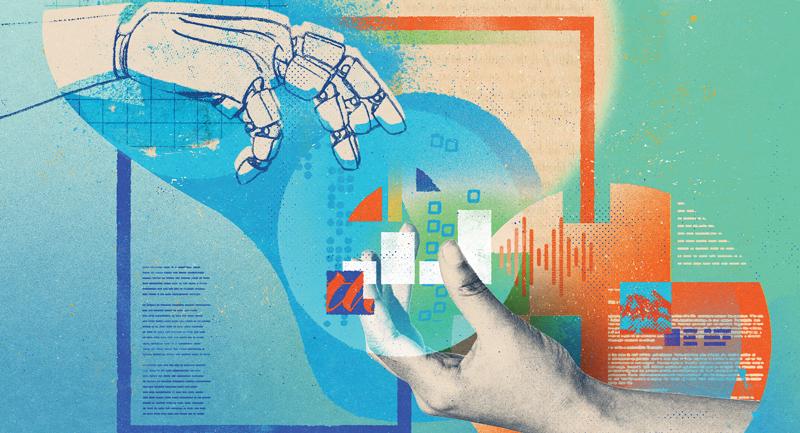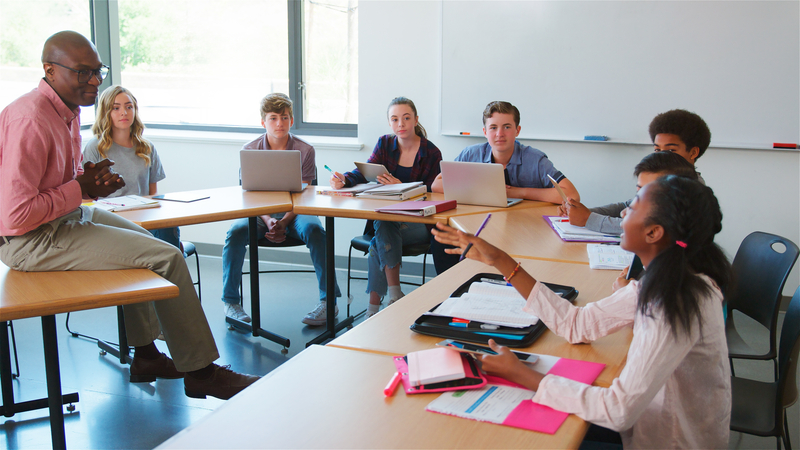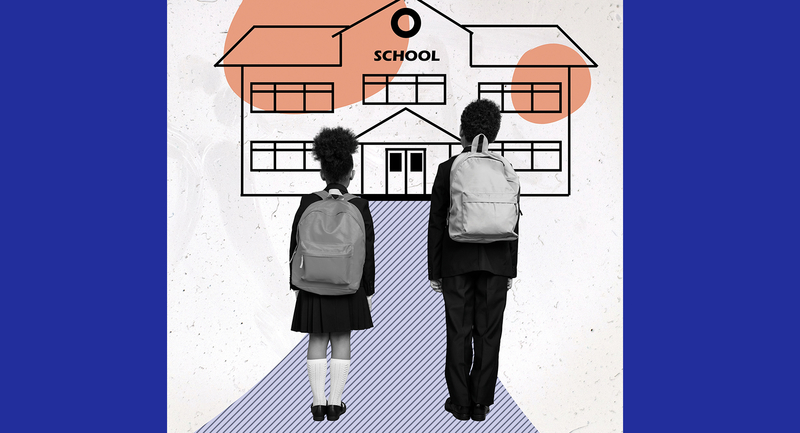My greatest fear about 21st century education is that Socrates' humility will be turned on its head. The noted philosopher once said, "I know nothing except the fact of my ignorance." My fear is that instead of knowing nothing except the fact of our own ignorance, we will know everything except the fact of our own ignorance. Google has given us the world at our fingertips, but speed and ubiquity are not the same as actually knowing something.
Think of learning as a continuum of cognitive and expressive experiences that range from gathering data for the purpose of understanding the world; to organizing data into useful and coherent informational patterns; to applying information to real questions and problems and, in the process, creating knowledge; to developing wisdom that offers the hope of transcendent unity. As our minds travel along this learning continuum, our understanding and depth of awareness grow, reshape themselves, and continue to evolve. At the same time, the great unexpected disrupters—imagination, spontaneity, and revelation—enable us to see the world differently and change it.
Socrates believed that we learn best by asking essential questions and testing tentative answers against reason and fact in a continual and virtuous circle of honest debate. We need to approach the contemporary knowledge explosion and the technologies propelling this new enlightenment in just that manner. Otherwise, the great knowledge and communication tsunami of the 21st century may drown us in a sea of trivia instead of lifting us up on a rising tide of possibility and promise.
Two Opposing Camps
Some advocates believe we can Google, blog, Skype, and Twitter our way to enlightenment. They assume that disorganized, radically democratized data lead to useful information and thus to real knowledge through some process of collective, randomized, constant connectivity. This argument rests on the premise that we learn best through data collection without the burdens of judgment and discernment. From an epistemological point of view, this is a highly questionable hypothesis. Learning requires stable, flexible cognitive frameworks and consistent forms of adaptive assessment.
In opposition are the skeptics, such as Mark Bauerlein, who argues in his book The Dumbest Generation (Penguin, 2008) that this incessant communication is really a complex manifestation of miscommunication that does not lead to intellectual growth, but rather to a stunting of genuine intellectual development. The Internet culture facilitates a kind of solipsistic, permanent adolescence that is profoundly anti-intellectual. A quick walk through the cultural landscape of the Internet suggests that "being online" can contribute to hyper-individualism and a sense of unearned celebrity, not to mention occasional weirdness.
The inventive curve of new technologies is so steep that the Internet culture will undoubtedly become more ubiquitous and communicatively dense as it continues to challenge the intellectual and academic culture that has come down to us from the European Enlightenment and the Industrial Revolution, both of which convinced us that we can make a better world through creating knowledge and applying it to human needs. This process requires literacy, a personal and communal discipline that appears to be in decline. As fewer of us are reading books, more of us are surfing the Web for fragments of thought. The collapse of the conventional newspaper business is perhaps an early warning sign of what is to come in the next 5 to 10 years.
Human society has experienced three profound social, economic, and cultural transformations—the agrarian revolution, the Industrial Revolution, and now the electronic revolution. We need to be on the right side of history if we are to survive and thrive. If we harness them correctly, we can blend the best of our traditional intellectual linear culture—Socrates' wisdom of the 5th century BCE—with the current digital culture, creating a new learning and intellectual environment consistent with the cognitive and expressive demands of the 21st century.
The 21st Century Mind
A child born today could live into the 22nd century. It's difficult to imagine all that could transpire between now and then. One thing does seem apparent: Technical fixes to our outdated educational system are likely to be inadequate. We need to adapt to a rapidly changing world.
The 21st century mind will need to successfully manage the complexity and diversity of our world by becoming more fluid, more flexible, more focused on reality, and radically more innovative. Four elements of the 21st century mind could be the basis of a new approach to education.
Critical Reflection
Every day we are exposed to huge amounts of information, disinformation, and just plain nonsense. The ability to distinguish fact from factoid, reality from fiction, and truth from lies is not a "nice to have" but a "must have" in a world flooded with so much propaganda and spin.
Human beings already are prone to think in magical terms; our media-driven social environment has intensified this tendency to live in imaginary worlds. The celebrity cult replaces real heroes with made-up ones, much to the detriment of children's mental health. Tragically, far too many young people experience this manufactured culture as though it were real.
Critical reflection enables us to see the world from multiple points of view and imagine alternate outcomes. For example, for many years, the dominant U.S. culture described the settling of the American West as a natural extension of manifest destiny, in which people of European descent were "destined" to occupy the lands of the indigenous people. This idea was, and for some still is, one of our most enduring and dangerous collective fabrications because it glosses over human rights and skirts the issue of responsibility. Without critical reflection, we will continually fall victim to such notions.
Empirical Reasoning
A second element of the 21st century mind that we must cultivate is the willingness to abandon supernatural explanations for naturally occurring events. Floods, famines, and human misfortune have often been attributed to angry gods, fate, and fantastic cosmologies that externalize our locus of control, making us perpetual victims who must please the gods or fate to survive. These non-empirical "theories of everything" require us to suspend reason, fact, and logic. Although we can appreciate these worldviews for their aesthetic and poetic beauty, they are a poor foundation for problem solving. We can overcome our ignorance not with wishful thinking, but with testable hypotheses using observable data.
Thinking empirically is a form of social responsibility. The methods of science offer us a way of thinking that is a strong framework for a healthy and viable approach to problem solving and living together peacefully.
Collective Intelligence
The third element of the 21st century mind must be the recognition and acceptance of our shared evolutionary collective intelligence. Many people believe that education is a personal rather than a collective possession. Echoing our culture of possessive individualism, education has taken on the role of dispensing "cultural capital" to individuals on the basis of a merit system that is a camouflaged proxy for social class and social position.
Yet even a moment's reflection tells us that all knowledge is social. None of us are educational islands unto ourselves. There is a great deal of talk about teamwork today; the real basis of teamwork is the willingness to think collectively to solve common problems. Think of a team of astronauts in a space shuttle: No one astronaut, no matter how highly trained, can master the complexities of maneuvering a spacecraft alone. It requires a team on the ground and a team in space to overcome the technical and scientific complexities of exploring space, thus enlarging our understanding of the universe.
Metacognition
To solve the 21st century's challenges, we will need an education system that doesn't focus on memorization, but rather on promoting those metacognitive skills that enable us to monitor our own learning and make changes in our approach if we perceive that our learning is not going well.
Metacognition is a fancy word for a higher-order learning process that most of us use every day to solve thousands of problems and challenges. When we think about thinking, we turn our mental pictures around ever so slowly to view them from different angles. Imagine yourself as a landscape painter. How do you decide on your angle of vision, on your perspective, or on your color palette? We do this type of decision making in a seamless cycle of rethinking and reshaping our internal imagery.
As the challenges facing the globe become increasingly complex, our frames of reference must be flexible, expansive, and adaptive. Consider the world water crisis: Thousands of people—mostly children—die every day from diseases caused by a lack of clean fresh water. Today, roughly 30 countries experience water stress or scarcity. By the year 2025, that number will be 56, meaning that 817 million people will be without adequate fresh water. Solving this crisis requires using multiple frames of reference and diverse methods of analysis that include geology, hydrology, economics, sociology, cultural history, politics, and law. By looking at a challenge from multiple points of view, we are more likely to arrive at a realistic, effective solution.
Learning in the Electronic Age
We are at the threshold of a worldwide revolution in learning. Just as the Berlin Wall fell in 1989, the wall of conventional schooling is collapsing before our eyes. A new electronic learning environment is replacing the linear, text-bound culture of conventional schools. This will be the proving ground of the 21st century mind.
In the age of print, people thought of knowledge as fixed and hierarchical, something that only great minds could change in a slow process of discovery. Not so in the age of electronic learning, where knowledge creation is fluid, fast, and far more democratic. The linear literacy of the age of print gave birth to the concept of accumulating knowledge systematically in archives, libraries, and databases. The age of electronic learning calls out for an updated approach. We need virtual libraries that host genuine knowledge and that enable learners of all ages to interact with one another in knowledge creation, as they currently do on Wikipedia.
In a 2008 issue of the Harvard Business Review, Bala Iyer and Thomas H. Davenport published a provocative article that outlined Google's business strategy: Practice strategic patience, rule your own ecosystem, exercise architectural control, build innovation into organizational design, support inspiration with data, and create a culture "built to build." This approach of continual innovation supports Google's mission "to organize the world's information and make it universally accessible and useful."
Today, we use Google to obtain information. Imagine being able to access organized learning in the same manner. In a concept I call the LearningSphere, a free and open-source Web-based portal and platform would enable learners to access organized inquiry, demanding courses of study, and communication capacities that would join people all over the world in mutual discovery.
Evolving technologies are making this concept more plausible. In a recent article, Gerald Huff and Bror Saxberg (2009) describe what they call a "full immersion" learning experience. Instead of thinking about the new learning and communication technologies as "technology," they suggest that in the future we will incorporate a whole array of technological options into how, when, and where we learn. We will cease to think of technology as something that has its own identity, but rather as an extension of our minds, in much the same way that books extend our minds without a lot of fanfare. According to Huff and Saxberg, immersive technologies—such as multitouch displays; telepresence (an immersive meeting experience that offers high video and audio clarity); 3-D environments; collaborative filtering (which can produce recommendations by comparing the similarity between your preferences and those of other people); natural language processing; intelligent software; and simulations—will transform teaching and learning by 2025.
Technology Meets Socratic Inquiry
In addition to having free access to knowledge and using immersive technologies, we also need a method of systematically applying knowledge to real-world challenges. Here's where Socrates can help. He believed that learning came from within and that the best and most lasting way to bring latent knowledge to awareness was through the process of continual questioning and unconventional inquiry. For Socrates, answers were always steps on the way to deeper questions.
So imagine that a group of teachers and middle school students decides to tackle the question, What is justice? Young adolescents' discovery of injustice in the world is a crucial moment in their development. If adults offer only self-serving answers to this question, students can become cynical or despairing. But if adults treat the problem of injustice truthfully and openly, hope can emerge and grow strong over time.
As part of their discussion, let's say that the teachers and students have cocreated a middle school earth science curriculum titled Water for the World. This curriculum would be a blend of classroom, community, and online activities. Several nongovernmental organizations—such as Waterkeeper, the Earth Institute at Columbia University, and Water for People—might support the curriculum, which would meet national and state standards and include lessons, activities, games, quizzes, student-created portfolios, and learning benchmarks.
The goal of the curriculum would be to enable students from around the world to work together to address the water crisis in a concrete way. Students might help bore a freshwater well, propose a low-cost way of preventing groundwater pollution, or develop a local water treatment technique. Students and teachers would collaborate by talking with one another through Skype and posting research findings using collaborative filtering. Students would create simulations and games and use multitouch displays to demonstrate step-by-step how their projects would proceed. A student-created Web site would include a blog; a virtual reference room; a teachers' corner; a virtual living room where learners communicate with one another in all languages through natural language processing; and 3-D images of wells being bored in Africa, Mexico, and Texas.
In a classroom like this, something educationally revolutionary would happen: Students and adults would connect in a global, purposeful conversation that would make the world a better place. We would pry the Socratic dialogue from the hands of the past and lift it into the future to serve the hopes and dreams of all students everywhere.
The Future Is Here—Almost
Some of what constitutes this new approach to learning is already underway. Teachers and students already use the Web to create lessons, communicate, and share with others across the globe. Schools have Web-based curriculums, and many people already use Web 2.0 technology to reach thousands, if not millions, of learners.
But a model like the LearningSphere would add another dimension. Learning would take place both in and out of school. Teachers would no longer manage learning through the rigid enforcement of rote learning but would learn alongside their students, creatively adapting curriculum to their students' needs. Like any creative effort, this collective journey would include errors, lack of good information, and false starts—a process of which Socrates would approve. Because teachers are knowledgeable about the learning process, they could serve as capable guides for their students, all the while promoting the requisite 21st century thinking skills of critical reflection, empirical reasoning, collective intelligence, and metacognition.
Organizing this new learning model is the work of the 21st century. Just as the industrial age developed a particular form of organizational life, the electronic age is developing models of organizational life that are more atomic in their structure than they are brick and mortar. When Einstein shocked the world by suggesting that energy is matter moving at twice the speed of light, he gave us a metaphor for our era.
There has never been a time in human history when the opportunity to create universally accessible knowledge has been more of a reality. And there has never been a time when education has meant more in terms of human survival and happiness.
What Would Socrates Do?
At the beginning of the 20th century, the world's population was 1.6 billion; at the beginning of the 21st century, it is roughly 6.6 billion. To meet the education needs of this rising tide of humanity, we must think outside the box of conventional schooling.
To start, we must overhaul and redesign the current school system. We face this great transition with both hands tied behind our collective backs if we continue to pour money, time, and effort into an outdated system of education. Mass education belongs in the era of massive armies, massive industrial complexes, and massive attempts at social control. We have lost much talent since the 19th century by enforcing stifling education routines in the name of efficiency. Current high school dropout rates clearly indicate that our standardized testing regime and outdated curriculums are wasting the potential of our youth.
If we stop thinking of schools as buildings and start thinking of learning as occurring in many different places, we will free ourselves from the conventional education model that still dominates our thinking. Socrates did not teach in a conventional classroom; his classroom was wherever he and his students found themselves. His was the first "personal learning network," and he taught with the most enduring teaching tool of all time—the purposeful conversation. He called himself a citizen of the world because the questions he asked were universal.
Even though Socrates was a philosopher, he did not hide in an ivory tower. He used knowledge to challenge the status quo. I think Socrates would embrace the new learning era with all the energy he had. We need that same embrace today to move beyond the false dichotomies and empty arguments of our tired education disagreements and to joyously engage with the future.








